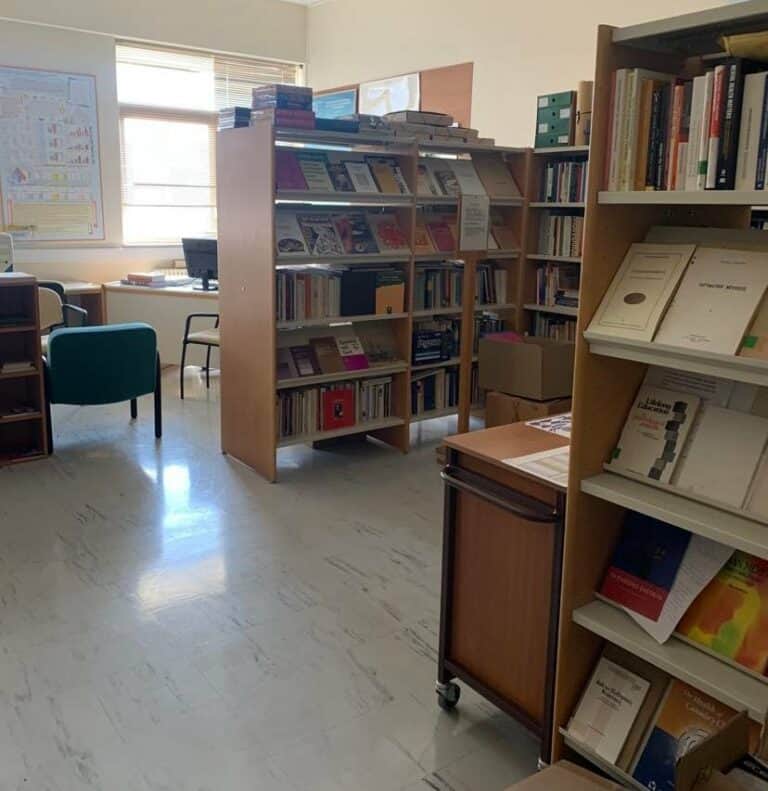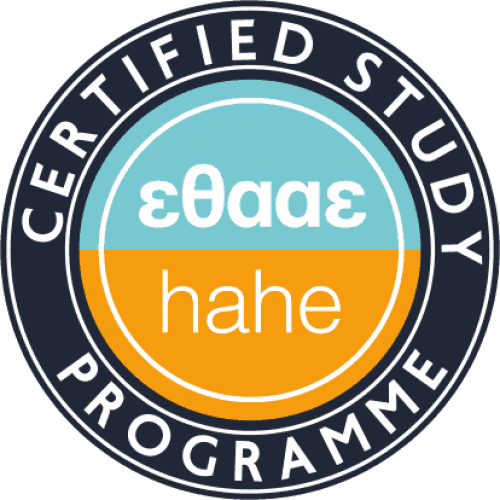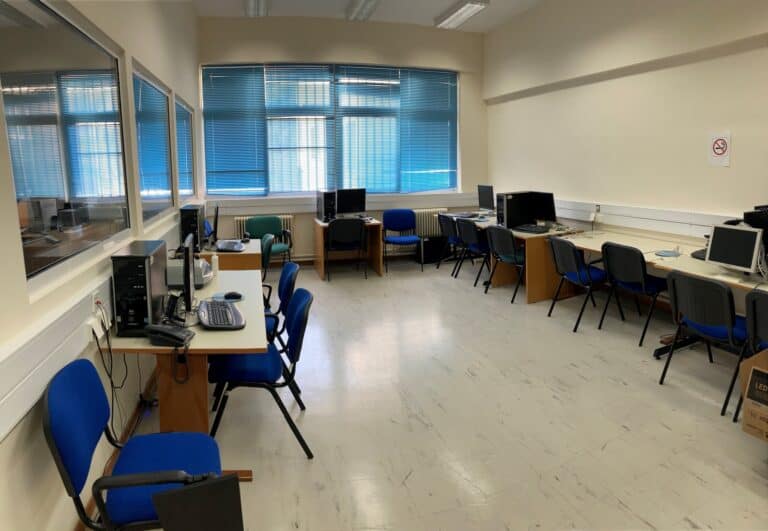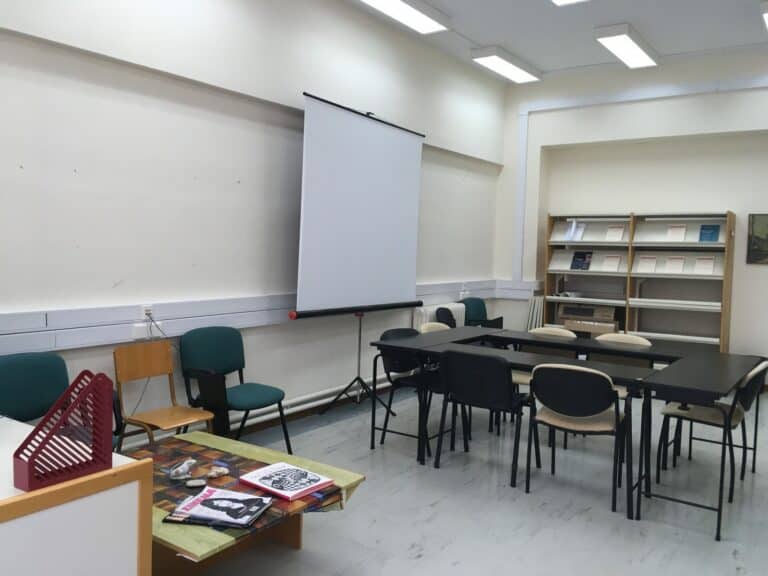Laboratories
Within the framework of the academic operation of the Department of Psychology, three Laboratories operate
Laboratory of Educational, Cognitive and Developmental Psychology
(FEK 568, B’, 21/2/2018)
Director: Evangelia Karagiannopoulou, Professor of Educational Psychology
The mission of the Laboratory is:
(a) to cover the teaching, research and broader educational needs of the Department of Psychology as well as of other Departments of the University of Ioannina, on issues that fall into the fields of Educational, Cognitive and Developmental Psychology at undergraduate and postgraduate levels (including doctoral and postdoctoral research). More specifically, the research and broader scientific work of the laboratory concerns the study of the following objects, by means of quantitative and qualitative methodologies:
Α. Educational psychology.
(1) Cognitive processes, emotions and learning
(2) Teaching and learning; contextual factors
(3) Factors influencing learning (e.g. individual, psycho-emotional, social), (neuro)biological aspects, mental health and learning
(4) Learning, adaptation and development
(5) Interventions in the field of education
(6) Learning and teaching in higher education
(7) The psychoanalytic perspective on learning
Β. Cognitive psychology
(1) Unconscious and conscious learning and memory and factors influencing them
(2) Experimental exploration of cognitive processes
(3) Cognitive processes underlying eating behaviour and (excessive) alcohol consumption
(4) Concept acquisition and categorisation
(5) Attentional biases
(6) Exploration of cognitive factors in clinical and health psychology
C. Developmental psychology
(1) Development of non-verbal and verbal interaction
(2) Formation of self and identity
(3) Social development of emotions and feelings
(4) The embodied development of Mind, Perception and Memory
(5) Cross-cultural development and applications to vulnerable populations
(6) Developmental psychopathology
(7) Interdisciplinary and critical approaches to development
Social Psychology Laboratory
(FEK 424, B’, 14/2/2018)
Director: Eleftheria Dogoriti, Associate Professor of Interlingual and Intercultural Communication in Professional Environments
The Laboratory’s mission is:
(a) To meet the teaching and research needs of the Department of Psychology, as well as of other Departments of the University of Ioannina, at undergraduate and postgraduate levels, on topics that fall within the scope of Social Psychology. More specifically, the research and scientific work of the laboratory concerns the following topics:
(1) Socio-psychological study of intergroup relations and processes.
(2) Social psychology and cultural processes.
(3) Social psychology, migration and transnational processes.
(4) Social psychology of collective action.
(5) Social psychology and political issues.
(6) Social psychology and contemporary social problems.
(7) Research methodologies in social psychology.
(8) The theory of social psychology.

Mental Health and Psychosocial Wellbeing Lab (MHPW Lab)
(FEK 336, B’, 05/02/2025)
Director: Panoraia Andriopoulou, Associate Professor of Clinical Psychology
Research and Scientific Work of the Laboratory
(a) The research and broader scientific work of the laboratory focuses on the study of the following areas, using both quantitative and qualitative methodologies:
- Therapeutic properties of interpersonal relationships – attachment theory.
- Psychotherapeutic relationship.
- Processes in counseling and psychotherapeutic interventions.
- Parent-child relationship, parenting practices, parental counseling, and special topics (adoption, assisted reproduction, divorce, etc.).
- Romantic relationships.
- Mental health of refugees and migrants.
- Interpersonal/developmental and intergenerational trauma:
- Study of contributing factors, processes of creation and intergenerational transmission, impact on mental health and well-being, and therapeutic approaches.
- Mental health and well-being from a gender perspective:
- Women’s mental health (perinatal mental disorders, assisted reproduction, gender-based violence and abuse in various contexts such as family, workplace, online, etc.).
- LGBTQ+ communities and gender identities.
- Promotion of overall mental health.
- Study of the self.
- Design and implementation of short, empirically validated interventions with psychoeducational, counseling, and psychotherapeutic content, aiming at empowerment, personal development, trauma management and healing, and overall promotion of mental health and well-being for students and other social groups at individual, family, and group levels.
- Clinical ethics and deontology.
- Development and application of theories and methods related to psychotherapeutic approaches:
- Cognitive Behavioural Therapy
- Systemic Therapy
- Narrative Approach
- Schema Therapy
- Dialogical Self Approach
- Psychodynamic Approaches
- Person-Centered/Existential Approaches
- Education, personal development, development of a professional identity, supervision, and self-care for Clinical Psychologists, Counseling Psychologists, and Psychotherapists.
- Assessment methods:
- Adaptation and standardization of quantitative assessment and diagnostic measures/tools.
- Development and application of qualitative assessment methods related to the above research areas.
Mission
Within the framework of the above research activities, the laboratory aims to:
- Support, at undergraduate, postgraduate, doctoral, and postdoctoral levels, the educational and research needs of the Department of Psychology, to which the laboratory belongs, as well as those of other departments of the University of Ioannina in fields relevant to the laboratory’s research focus.
- Support the implementation of postgraduate dissertations, doctoral theses, and postdoctoral research related to the laboratory’s areas of interest.
- Publish monographs and/or translated texts/textbooks relevant to Clinical Psychology, Counseling Psychology, and related fields.
- Foster interdisciplinary collaboration with research centers, academic institutions, and organizations in Greece and abroad with similar scientific goals and study fields.
- Publish research findings, theoretical analyses, and techniques/methods of counseling and psychotherapeutic interventions in reputable academic journals.
- Disseminate research findings nationally and internationally through participation in seminars, conferences, workshops, digital media, mass media, and the laboratory’s website.
- Organize conferences, seminars, workshops, and summer schools on relevant topics.
- Participate in national, European, and international research and educational programs, as well as corresponding scientific networks.
- Facilitate mobility of faculty members, undergraduate and postgraduate students, doctoral candidates, and postdoctoral researchers to research institutes and universities in Greece and abroad for research purposes, collaboration development/expansion, or access to equipment unavailable at the Laboratory and the University of Ioannina.
- Provide specialized services to third parties (individuals or legal entities) in accordance with applicable legislation and the mission of the university, particularly to public sector bodies as defined by the Greek law.
- Train and supervise Clinical and Counseling Psychologists and Psychotherapists in intervention models relevant to the laboratory’s areas of expertise.
- Train psychology students in innovative research methods and data analysis techniques.
- Secure resources and funding from private entities, organizations, associations, and institutions in Greece and abroad.
- Connect with the local and broader community by organizing awareness events, psychoeducational workshops, and mental health and well-being promotion activities.
- Undertake any other scientific, research, teaching, support, and training initiatives related to Clinical and Counseling Psychology.



